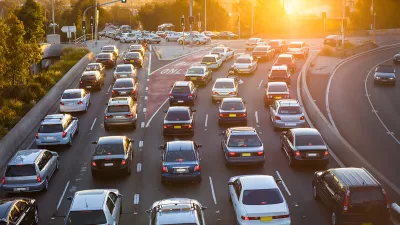Aaron Renn provides a dissenting argument on the implications of peak car, namely, "if we’ve really reached peak car, maybe we really can build our way out of congestion after all."
Aaron Renn builds his argument about a counterintuitive implication of peak car on data about the unprecedented decline of vehicle miles traveled since 2005, which has left U.S. Department of Transportation traffic projections (and many others) way off target. In doing so, Renn acknowledges that many freeway projects, driven by "speculative demand," should be questioned.
Yet in a novel twist, Renn argues that induced demand has a flip side: "In a world of peak car, where traffic levels are flat to declining on a per capita basis, induced demand no longer holds court, certainly not to the level claimed by those who believe it’s pointless to build roads." Even in perpetually congested places like Los Angeles, suggests Renn, "peak car strengthens the argument for building or expanding roads."
FULL STORY: Urbanists need to Face the Full Impacts of Peak Car

Planetizen Federal Action Tracker
A weekly monitor of how Trump’s orders and actions are impacting planners and planning in America.

Maui's Vacation Rental Debate Turns Ugly
Verbal attacks, misinformation campaigns and fistfights plague a high-stakes debate to convert thousands of vacation rentals into long-term housing.

San Francisco Suspends Traffic Calming Amidst Record Deaths
Citing “a challenging fiscal landscape,” the city will cease the program on the heels of 42 traffic deaths, including 24 pedestrians.

Amtrak Rolls Out New Orleans to Alabama “Mardi Gras” Train
The new service will operate morning and evening departures between Mobile and New Orleans.

The Subversive Car-Free Guide to Trump's Great American Road Trip
Car-free ways to access Chicagoland’s best tourist attractions.

San Antonio and Austin are Fusing Into one Massive Megaregion
The region spanning the two central Texas cities is growing fast, posing challenges for local infrastructure and water supplies.
Urban Design for Planners 1: Software Tools
This six-course series explores essential urban design concepts using open source software and equips planners with the tools they need to participate fully in the urban design process.
Planning for Universal Design
Learn the tools for implementing Universal Design in planning regulations.
Heyer Gruel & Associates PA
JM Goldson LLC
Custer County Colorado
City of Camden Redevelopment Agency
City of Astoria
Transportation Research & Education Center (TREC) at Portland State University
Jefferson Parish Government
Camden Redevelopment Agency
City of Claremont





























